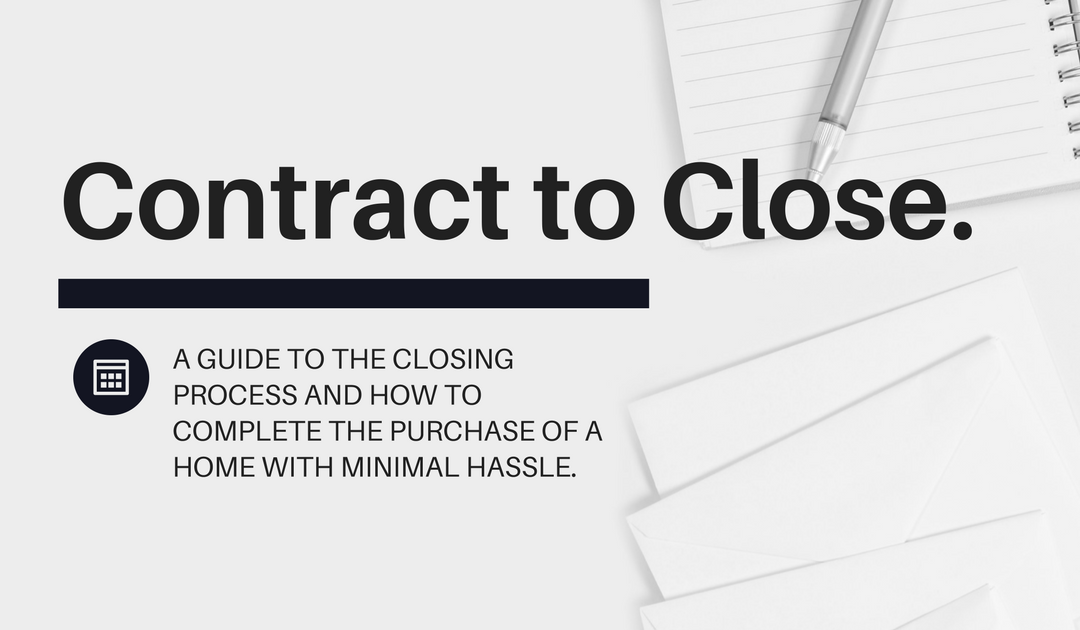
Contract to Close Checklist
Congratulations! You are now under contract to purchase a home. Between the contract signing and closing of your home, there can be a lot of stress involved in the process. However, if you follow our checklist, you should be ready to close right on time.
Right Away
Finalize Your Mortgage
If the contract for the home you are purchasing includes a financial contingency, you have a predetermined amount of time to be approved for your mortgage. As soon as you have a contract, start working with your lender right away to get them everything they need. There are likely to be additional requests from your lender to clarify things or provide documentation so make sure you respond quickly and get them everything they need.
Schedule Your Home Inspection
Before you purchase a home, you should do a thorough home inspection of the property. If something comes up in the home inspection, you may not have enough time to resolve the issue if you wait too long to address it. While you are under contract to purchase the home, you have a certain amount of time to investigate the home. Acting quickly will ensure you have a thorough understanding of the home’s condition as soon as possible.
Three Weeks Prior to Closing
Order an Appraisal
Now that you have made it through the home inspection, it’s time to order an appraisal. If you are getting a mortgage, your lender will require this. An appraisal will determine the value of your home at the time of purchase. This is to protect you and the lender as well. Generally, the lender will take care of ordering this for you. You are just responsible for paying for it. However, even if you are not getting a mortgage, an appraisal is still a good idea. They aren’t that expensive—normally less than $500—and will ensure the value of the property is where you think it should be.
Have a Title Search
This is another item you aren’t directly responsible for. The title company that will be responsible for the closing of the property will take care of this for you. The title search will investigate the title of the property and confirm there aren’t any outstanding issues such as an unpaid mortgage, property taxes, or anything else that will cause a problem with the title of the property. The title company will also provide a title insurance policy at closing that will protect the lender should issues arise after you purchase the home. Traditional title insurance only protects the lender. Should you desire to have protection as well, let the title company know and they can arrange this for you.
Schedule Your Move
Now is the time to start planning the details of your move. Some of the things you will need to coordinate include hiring a moving company or renting a moving truck if you plan to do it yourself and setting up accounts for your utilities. Now would be a good time to start packing if you haven’t already.
Two Weeks Prior to Closing
Make Arrangements for Homeowner’s Insurance
Your mortgage lender will require you to carry homeowner’s insurance on the property. Because it is a requirement of your mortgage, don’t wait until the last minute to take care of this. If the lender doesn’t have the information they need, it could delay closing unnecessarily. When choosing insurance, it is a good idea to get multiple quotes. This may allow you to save some money or get you a better policy for the same cost as others.
Secure Your Home Warranty
If you aren’t familiar with home warranties, they are a warranty program designed to prevent you from being surprised by costly repairs when something in your home breaks. A home warranty will not cover everything, but it will cover the major systems in your home, such as HVAC, plumbing, and appliances. Each warranty will list the specific items it covers. Some items, such as pools, can be covered for an additional cost if the home you are purchasing has one.
Confirm That Closing is Scheduled
Your agent may have already taken care of this for you. By now, you are close enough to closing to have a good idea of when you will be ready to close so you can plan for it. When scheduling the closing, plan for it to last at least an hour.
One Week Before Closing
Schedule Your Final Walk-Through
The final walk-through will allow you to investigate the property again to make sure it is in the same or better condition than when you saw it previously.
Confirm Move Details
Follow up with the mover to confirm the date and time of your move. This would also be the perfect time to complete your forwarding address with the post office.
Make Arrangements for any Payments You Need to Make at Closing
You may need to take cashier’s checks to closing or wire funds. Talk with the title company to find out the amount you will need to bring and the method of payments they will accept. Don’t let something like this delay closing because you didn’t plan ahead.
Day of Closing
Attend Closing
Closing day is here, and it’s time to sign your paperwork and finalize all the details. Don’t forget to ask questions as you go through closing if there is something you are unsure of. Make sure to take a photo ID and any money you need to bring to closing with you.
All of these steps will help make sure you are ready to close on closing day. Congratulations!


